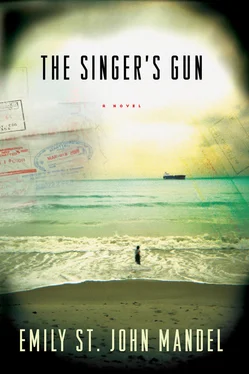There were the shipments, for instance, that arrived at three in the morning in unmarked vans. The vans pulled up to the loading dock in front of the warehouse and yielded their treasures: old furniture, entire marble fireplaces torn from walls, elaborate clocks. There was a crew that went out at one A.M. with wire cutters and crowbars and returned before dawn with ornate wooden railings from abandoned houses, 1920s-era school drinking fountains pried from the walls of condemned yeshivas, entire leaded-glass windows from boarded-up churches. Statues, chandeliers, mosaics pried meticulously from walls. And he’d been aware of all this forever, there’d never been a time when he hadn’t half-woken in the darkness to the sound of men moving heavy objects on the other side of the thin wall separating the apartment from the store, but at eleven he found himself thinking about the question of provenance. That was the year when he realized that the practice of receiving shipments at three A.M. was somewhat unorthodox; his best friend Gary’s father owned a small grocery store nearby, and he was aware that Gary’s father’s shipments arrived after the sun had come up. Anton and Gary discussed the matter at some length, sitting on the sidewalk outside the store sucking on popsicles.
“Deliveries come in the mornings,” Gary said.
“But three A.M.’s still the morning,” said Anton. “Just earlier.”
“Three A.M.’s not the morning. My dad said morning’s when the sun comes up.”
“Why would they call it three in the morning if it wasn’t the morning?”
“It’s still dark outside. Everybody’s sleeping.”
“Well, why can’t a delivery come early?”
“I don’t know.” Gary was looking at his popsicle, considering the problem. “If it comes in the middle of the night I think it’s maybe not a regular delivery. I think then it’s maybe something else.”
Later that day Anton sat on a crate at the back of the store, watching his father working on an old fountain, and it didn’t seem like an unreasonable question—“Dad, why do so many deliveries come at night?”—but his father didn’t seem to like it. The fountain was an enormous white stone basin with stone birds perched everywhere, and his father kept scraping the grime from delicate stone feathers and didn’t answer. The muscles in the back of his neck tensed up.
Anton persisted. “The stuff we sell,” he said, choosing his words carefully.
“What about it?”
“Is it possible. . is it ever. .”
“What? Is it ever what?”
“Is it ever stolen? I mean earlier ,” he said quickly, as his father set down the chisel and turned to him. “I mean not by us. I mean before it gets to us.”
His father’s face was expressionless. He looked at Anton for a moment, turned away from him and resumed his careful work.
“Sometimes you need to improvise,” he said.
“What do you mean?”
“I mean that sometimes regular channels aren’t open to you, and then you have to improvise. Find your own way out. Think about it, Anton. What does it take to succeed in this world?” It was clear that he expected no answer from his son. “Finishing high school? A college degree? What if you had to leave high school to work? Money? Connections? What if you have none? Hard work? When everyone else in this frantic city is working just as hard as you are?”
Anton was silent, watching him.
“All I’m saying is, it isn’t easy,” his father said. “It’s never easy. You have to be creative sometimes. You have to make things happen for yourself.”
Anton watched him for a while longer and then drifted out to the front of the store. There was a hundred-year-old bicycle there that he liked, leaning up against the doorframe. He didn’t dare ride it but he spent some time running his fingers over the rough texture of the metal, the dusty crossbar and the damaged seat, imagining someone else riding it a long time ago. He could see the river. He stood on the loading dock looking out at the water and the looming bridge above and the brightening spires of Manhattan on the other side, so close, so close.
That night his father came into his room to say goodnight. He kissed Anton on the forehead, as he had every night for as long as Anton could remember, and then he sat on the edge of the bed for a moment longer before he spoke.
“Everything I do,” he said, “all of this, it’s all for you and your mother. This is how I provide for you. Do you understand?”
Anton nodded.
“I love you,” his father said, and then he stood up quickly and left Anton alone.
“You just take it from the shelf,” Aria told him, in the summer when they were simultaneously thirteen. She was using the voice she reserved for small children and idiots. “You take it when they’re not looking, and then you don’t have to pay for it.”
“I don’t want to. I don’t want to.” They were standing under an awning across the street from the bodega. Anton’s knees were shaking.
“You don’t have to repeat yourself,” she said disgustedly.
“I just think. .”
“That stealing is wrong ,” she said, with exquisite contempt. “I know, you’ve told me. Wait here.” She walked away from him across the street in the sunlight and came out of the bodega a moment later with a chocolate bar for each of them, just as casually as if she’d paid for them. Just as if it wasn’t Gary’s father’s store.
At fourteen Anton passed by Aria’s room one night and her door was open a crack, just enough to spill a wedge of light out into the corridor, and he found himself waiting there, listening, stilled, but all he could hear was a rhythmic sound like scissors closing.
“I know you’re there,” she said. “Can you come in here?”
He froze for a moment but there was nothing to be done but push open the door and find her there in her nightgown, sitting cross-legged in a dark pool of hair on the floor.
“Help me with the back,” Aria said, and held out the scissors.
Anton closed the door behind him and stood perfectly still. She was destroying something beautiful, and he felt that he should say something but he didn’t.
“I’m serious, Anton. Take the scissors.”
He took the scissors from her outstretched hand and knelt on the floor behind her. She had attacked her hair unevenly, from a number of angles, but at the back a section still hung straight and shining almost to the floor. He lifted the sheen and carefully cut it away in pieces, until her neck was visible and hot to the touch when his hand brushed accidentally against her skin. He swallowed hard.
“You’re ogling my neck,” she said pleasantly. “Pervert.”
“I’m sorry.” His voice was hoarse. He tried to even out her hair as best he could, but it still looked ragged when he was done with it and he was afraid to make it any shorter. He set the scissors down on the floor and they sat in silence for a moment, almost not breathing, so close that her nightgown touched his legs. Until he whispered, strained, “I’m not sure what you want me to do.”
“Nothing,” she said, the spell broken. She smiled over her shoulder, and then stood up and brushed pieces of hair from her nightgown. “I just wanted shorter hair. Goodnight.”
Anton closed the door behind him and then spent a fevered hour in his bed entertaining an alternative version of events in which she turned to him and pulled her nightgown off over her head.
“What is there to think about?” Aria asked. “We have both supply and demand.”
Anton was sitting on the loading dock of his parents’ store looking out at the river, eighteen years old. Aria stood nearby smoking a cigarette and explaining a business proposition. He had graduated high school the previous spring and his grades were superb but he’d applied to no colleges, and now summer was over and he was tired and trapped. He’d stopped smoking, which seemed like his only accomplishment in a while. He had grandiose ideas with no clear structure to them. He had no long-term plans but he found himself anxious for the future to start, whatever the future might entail. Aria had graduated a year earlier and it seemed implicitly understood that she wasn’t going to college either, although she spent most of her time rereading Machiavelli and it was obvious to Anton that she was smarter than him. What he wanted was to be an executive of some kind, to work in an office, but he wasn’t sure he wanted to go to school to achieve this. He had an idea that there had to be some easier, less expensive way, a different approach that might somehow be faster. He’d spent a lot of time trying to explain this suspicion to Gary, who was going to Brooklyn College next month and didn’t really understand what he was talking about.
Читать дальше





![Ричард Деминг - Whistle Past the Graveyard [= Give the Girl a Gun]](/books/412176/richard-deming-whistle-past-the-graveyard-give-t-thumb.webp)






